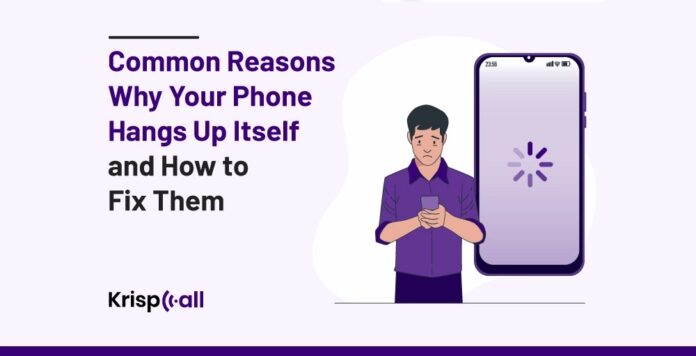Your phone automatically hangs up after 8 hours due to carrier-imposed call time limits. These restrictions prevent system overloads and manage network resources.
Modern smartphones and telecommunication networks are designed to cater to a multitude of user needs, from connecting calls to streaming high-quality video. Amid this intricate symphony of digital communication, your phone’s habit of hanging up after a lengthy conversation might seem jarring.
This cutoff is not a malfunction but a deliberate feature implemented by your service provider. Phone calls that extend for several hours occupy network space and can affect overall service quality. Service providers aim to maintain optimal network performance and availability for all users, making such policies a necessity in an ever-connected world. Understanding this reason for automatic disconnection can mitigate confusion and ensure that your expectations are in line with the technical realities of modern-day mobile communication.

Credit: www.amazon.com
Unpacking The 8-hour Disconnect
Have you ever wondered why your phone call automatically ends after 8 hours? Could there be a science behind this abrupt termination, or is it a consequence of regulatory policies?
The Science Behind Automatic Call Termination
Phone technology is smart. It needs to manage resources.
Long calls can cause issues. To avoid these, automatic hang-up features kick in.
Batteries get drained. Networks become congested.
These factors trigger the 8-hour cut-off point.
- Optimizes battery life
- Prevents network overload
- Ensures continuous service quality
Every call gets a time stamp. That time controls call durations.
Regulatory Policies And Their Impact On Call Duration
Regulations are there for a reason. They protect consumers and networks alike.
| Policy | Purpose | Effect |
|---|---|---|
| Call Duration Limit | To manage fair usage | Uniform service for everyone |
| Resource Management | To optimize network performance | Smooth experience for users |
Such policies dictate the 8-hour disconnect.
Telecom companies follow them. This ensures fair usage for all subscribers.
Long calls get monitored. They might be mistakenly seen as network glitches.
Regulations mandate an automatic disconnection to reset the system.

Credit: www.amazon.com
Network Provider Protocols Explained
Ever been deep into a phone marathon and suddenly, the call drops? Most people have. It’s not you. It’s your network saying, “Time’s up!” This happens due to specific provider protocols. Understanding these can clear up any confusion and make communication smoother.
System Resets And Maintenance Cycles
Providers must maintain their networks. They do this with regular system resets. These resets ensure quality. Think of them as network ‘nap times’. They help the system work better for you.
Imagine this as a daily refresh for your network. A clean slate. Here’s why it matters:
- Updates: New features and fixes are applied.
- Consistency: Resets keep the service smooth and stable.
- Prevention: Stops issues before they start.
So, a call might end every 8 hours. It’s a small price for a well-kept network.
Network Congestion Management
Your call ends suddenly because the network needs space. Like traffic on a road, too many calls create jams. To manage this, networks set call limits.
Here’s a simple breakdown:
| Call duration limit | 8 hours |
|---|---|
| Purpose | Reduce jams, increase availability |
| Result | Clear lines for everyone |
No hiccups mean clear calls for all. Think of it as the network’s way of saying, “Take a break!” It’s about fair use, to let everyone talk.
Phone Software: Friend Or Foe?
Phone Software: Friend or Foe?
Imagine chatting with a friend or client, and suddenly, your call ends. You glance at your phone in surprise, only to realize it has hung up automatically after 8 hours. Is this a sneaky problem or a silent guardian working in the background? Let’s shed some light on whether your phone’s software is acting as a friend helping you manage your device’s wellbeing, or a foe disrupting your long conversations.
The Role Of Mobile Operating Systems In Call Limitation
Your phone’s operating system is like a gatekeeper. It regulates every function and app. Here’s why it might end calls after 8 hours:
- Pre-set Call Limits: Manufacturers often set up a max call duration.
- Network Stability: Long calls might get dropped to maintain network quality.
- Security Measures: This limit can help in preventing unauthorized use.
App And Battery Optimization – Preserving Phone Health
To extend your phone’s life, the software frequently checks app activity and battery status. Below is how this helps:
| Battery Optimization | App Optimization | |
|---|---|---|
| Benefits |
|
|
This smart management can sometimes interpret long calls as inactive sessions. Hence, it ends them to conserve energy and resources.

Credit: www.cbsnews.com
Analyzing The User Impact
Ever wondered why your phone call drops after an 8-hour mark? Surprisingly, this isn’t a random occurrence. Phones have built-in call limitations. This can affect how we interact and communicate in crucial ways. Let’s dive into the real impact this has on our daily lives.
How Call Limitations Affect Business And Personal Communications
Imagine a critical business deal or a heartfelt conversation with a loved one. Suddenly, the call ends. Frustrating, isn’t it? Phones automatically disconnecting long calls can lead to misunderstandings and disruptions in communication.
- For businesses, an automatic hang-up means potential loss of clients or interrupted service, damaging reputation and revenue.
- In personal scenarios, it could cut off important family discussions or special moments, affecting relationships.
Time-sensitive information shared during a call may be lost or misunderstood if the call abruptly ends. The impact is significant, leading to frustration and a decrease in productivity.
Adapting To The Norm: Workarounds For Long Conversations
We need solutions for uninterrupted communication. Luckily, there are easy workarounds to keep the conversation going, even after the 8-hour limit.
- Schedule a callback in advance around the 7-hour mark to avoid abrupt end.
- Use alternative communication tools like video conferencing apps, which often have more generous time limits.
- Set up a VoIP system for business calls to bypass traditional phone call limitations.
These simple adaptations can maintain the flow of information. They ensure important conversations continue without interruption.
| Solution | Description | Best For |
|---|---|---|
| Callback | Schedule a new call before the deadline | Business & Personal |
| Video Apps | Use apps with longer time limits | Personal |
| VoIP | Internet-based calling solutions | Business |
Understanding the limitations of our devices and preparing for them can significantly improve our communication experience.
Technological Evolution And Future Trends
The world of technology is constantly advancing, shaping the way we communicate. Often, your phone may automatically disconnect a call after a certain duration, like 8 hours. This isn’t random. It’s a product of technological progress and telecom guidelines. Let’s explore the race for better network infrastructure and how emerging technologies influence call duration norms.
The Race For Better Network Infrastructure
Telecom companies strive to provide flawless service. Network upgrades ensure calls stay clear without using too much power. Long calls can strain networks. A timed cut-off, often after 8 hours, prevents issues.
Here’s why a strong network matters:
- Quality and reliability: Better networks mean fewer dropped calls.
- Efficiency: Advanced networks handle more data with less effort.
- Innovation: New tech needs a solid foundation to work well.
Emerging Technologies Changing Call Duration Norms
Tech trends also redefine calling standards. 5G, VoIP, and AI all impact how long phones stay connected.
5G: Super-fast, reducing lingering calls to free up resources.
VoIP: Calls over the internet can last longer, but even those might have limits to manage the load.
AI: Artificial intelligence can optimize call duration, balancing quality and network health.
These technologies make sure calls serve us better:
| Technology | Improvement |
|---|---|
| 5G | High-speed, enhanced capacity |
| VoIP | Better integration with apps |
| AI | Smart call management |
Frequently Asked Questions For Why Does My Phone Automatically Hang Up After 8 Hours
Do Phone Calls Drop After 8 Hours?
Some phone carriers automatically end calls after a certain period, which can be around 8 hours, to prevent unintended usage. Always consult your carrier’s specific policies for details.
Why Does My Phone Automatically Hang Up?
Phones may automatically hang up due to low signal strength, software glitches, or outdated system software. Check for updates or consider resetting your phone settings to default.
How Do I Turn Off Call Limit On Iphone?
To turn off the call limit on your iPhone, navigate to Settings, tap ‘Phone,’ then select ‘Call Forwarding’ and toggle it off.
Why Does My Phone Call End On Its Own?
Phone calls can end abruptly due to poor signal strength, battery issues, phone glitches, or network problems. Updating your phone’s software may resolve this.
Conclusion
Wrapping up, the automatic hang-up feature on phones can be perplexing. It often boils down to network standards or built-in software settings. Don’t let this quirk disrupt your communication needs. By understanding the reasons, such as carrier-imposed limitations or battery preservation tactics, you’re now equipped to take control.
Keep conversations flowing smoothly with the insights from this post.





